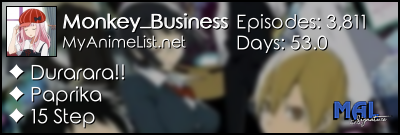Knowing nothing about the atmosphere around Boogiepop Phantom's original 1998 publication and subsequent 2000 adaptation, the series feels like a spillover from late 90s media and literature anxious about the present and future. In the US, this time was unique due to relative economic stability, leading to filmmakers creating titles reflecting that period of monotony. There was a lot of fears about what the future would hold, uncertainty as to what the new century would bring, and discontent regarding the lack of happenstance, albeit specifically for the typical middle class, middle-aged man. As such, there were a bunch of films such as Office Space, The Matrix, and Fight Club that provided introspection regarding that mentality, outlets for pent up frustrations, or general outbursts of fury over the perceived stagnation.
In Japan, from my understanding, the 90s was a period of stagnation in its own right, where Japan's economic bubble collapsed after peaking in the 80s. With Boogiepop Phantom, I've definitely felt an underlying anxiety despite the façade of the status quo in the overarching world. Feelings of boredom and disinterest in life has been brought up many times throughout the show, and it's through drugs, violence, sex, obsessions, and escapism that the anime's various characters have found ways to break away from their lives. That being said, certain characters suffering from abuse or trauma used those same methods to break away from their lives, often harming others and themselves in the process.
There's a thirst for change, if just to break away from getting railroaded into becoming a boring adult. Many characters feel stressed and trapped, as if their lives were predetermined by their parents or peers. They feel ridiculed for not being enthusiastic nor diligent in their studies, and are pressured to become successful for the sake of others. They may have also been abused emotionally or physically, driving a sense of fear to connect with others. At the same time, they're surrounded by friends and schoolmates who couldn't care less, and without any means to alter their present, instead seek to escape via the easiest, most convenient ways possible.
How are these students supposed to work towards a future they can't even see? How are they supposed to overcome the traumas of the past when the present doesn't seem to indicate any possibility for change? How can they take matters into their own hands when they don't have anyone to turn to, much less the means and resources to do so?
From my perspective, Boogiepop Phantom is written with the societal culture of Japan's late 90s in mind. It's atmosphere is very specific to that time, and it feels like a cry for help, or at least some kind of jolt to give hope for change, even if it's for the worse since at least something would happen. There's this sense of apathy, where characters question why they're alive if they're just going to die eventually. There's also a sense of despair and regret, where characters feel like they have to sacrifice dreams, ambitions, and personal freedom just to grow up. As such, they feel excited whenever anything different happens, ranging from mysterious murders, to global conspiracies, to threats of paranormal walking specter of Death.
Even if they weren't real, just the thought of them is enough to break the daily monotony. Imagine the thrill of knowing that a serial murderer stalks the streets, who is capable of transforming their shape and form. Or, think of the anticipation of human evolution, resulting in the select few to lead the pathway to the future, and all you have to do is wait around until your genes kick in. Alternatively, what if there were a wandering supernatural entity that could whisk you away to another plane of existence, far away from the endless suffering of daily life?
As a new-age form of horror, imagine the Manticore, or personification of anxiety and regret, existing through electronic waves and the internet, and there were no way to permanently kill it so long as such thoughts existed in modern human society? It would continue haunting and killing, hanging over people like an invisible devil over the shoulder. How do you kill a thought? Or, rather, how do you address the source of those thoughts: the continued existence and proliferation of modern society?
Then again, the ending of the 2000 Boogiepop Phantom anime treats this as more of a personal obstacle, which eventually fades if a person can successfully transition into adulthood. For the generation that grew up during the late 90s, their experiences differ greatly from their parents who lived through Japan's economic growth period, so it makes sense that they'd grow up into different people. At least, assuming they weren't living in a contained environment. It doesn't guarantee that they'll face dead-end lifestyles like the adults they grew up around, but for better or worse, their mentality will be different.
Holy crap, Boogiepop Phantom is a hell of an anime. It reminds me of a cross between Serial Experiments Lain and Welcome to the NHK, oddly enough. Boogiepop Phantom is a story about Japan's evolving-yet-stagnating, but it's also about the lives and struggles of people wading through personal uncertainties, anxieties, and trauma while attempting to survive an onslaught of temptations, conspiracy holes, and self-destruction amidst periods of extreme vulnerability. Goodness gracious. |





